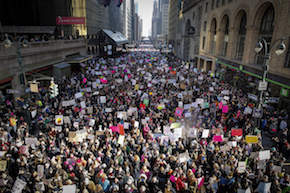Joining the March for Women

Protestors walk down 42nd Street near Grand Central Terminal during the Women’s March in New York City at Dag Hammarskjold Plaza. NYTMARCH NYTCREDIT: Nicole Craine for The New York Times
“…if you look at our country’s history, change doesn’t come from presidents. Change comes from large groups of angry people. And if Day 1 is any indication, you are part of the largest group of angry people I have ever seen.” Aziz Ansari, Saturday Night Live Monologue
Ever since the election, the Reproductive Health Access Project has seen a marked increase in activism and support for our work. Clinicians who were quiet, under the radar members of our Reproductive Health Access Network are stepping up to find out how they can be more involved, and physicians and nurse practitioners who were unknown to us have reached out to join our Network. Since the election, we have launched on the ground organizing efforts in 10 (!!!) new states. Health centers are reaching out for help integrating abortion into their scope of practice. In the last week alone, we began working with health centers in California, Idaho, and Massachusetts to help them wade through the red tape to add abortion and miscarriage care into their practices. The number of folks interested in volunteering with us skyrocketed–so much so that we are launching a new volunteer program (read on for more info on how to get involved.) We raised a record amount of money in our year-end appeal. The number of new donors increased by 80% and we tripled the number of recurring/sustaining donors. This is all, we believe, a result of a new wave of civic activism triggered by the election. It is amazing. Thank you!
On Saturday, January 22, people all around the world gathered peacefully in huge numbers in support of the Women’s March—a further testament to this newfound activism. Our team made posters, tabled, and marched with families and friends in marches all around the country: Los Angeles, San Francisco, Oakland, Boston, Rhode Island, Chicago, New York, and Washington, DC.
We are committed to keeping this momentum going. We’ll be sharing opportunities for activism that will expand access to reproductive health care. But one thing that we believe made the Women’s March so successful is that it wasn’t about just one issue. It was intersectional. People were marching for reproductive justice, environmental justice, racial justice, economic justice, and more. We will, in honor of that spirit, also be sharing opportunities to engage in intersectional activism. Working together, we can all move forward.
